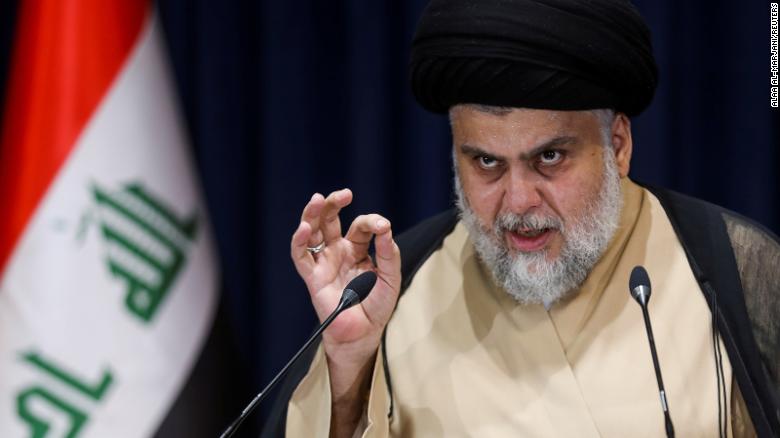
Cairo, Egypt (CNN) – After eight months of political paralysis, the kingmaker of Iraqi politics has ordered his bloc to withdraw from parliament.
The stepdown of Shia Muslim cleric Moqtada al-Sadr’s entire group of 73 lawmakers is the largest shakeup in Iraqi politics since an October election saw Iran-backed Shiite blocs losing seats to the Sadrists. The Sadrists now appear to have stepped back from parliamentary politics.
“This is a tectonic shift that threatens to derail the post-2003 political order in its entirety,” said Ranj Alaaldin, nonresident fellow in the Foreign Policy program at the Brookings Institution, a think tank in Washington, DC.
In a handwritten statement, Sadr said that his request for his lawmakers to resign was “a sacrifice from me for the country and the people to rid them of the unknown destiny.”
Sajad Jiyad, a fellow at The Century Foundation think tank in Washington DC, said the move “has changed the political discourse.”
The cleric is immensely popular in Iraq. For years he has positioned himself against both Iran and the United States, and in October emerged as the biggest winner in a parliamentary election that threatened to sideline Iran-aligned Shiite blocs that have long dominated the oil-rich country’s politics.
But politics has since been in a stalemate as bickering and accusations of corruption have stalled the presidential election and hindered the formation of a government.
“If the Sadrist bloc remaining [in parliament] is an obstacle to government formation, then all lawmakers of the bloc are honorably ready to resign from parliament,” said Sadr in a televised speech on Thursday, as he set the stage for the resignation.
Experts say that according to the procedure, once a lawmaker resigns and the process is finalized, the next lawmaker with the largest batch of votes steps in as a replacement.
“This will redistribute 73 parliamentary seats among various political blocs,” wrote Abbas Kadhim, a senior fellow at the Atlantic Council think tank, on Twitter, adding that Iran-aligned Shiites are expected to take over those seats, along with some independents.
So is Sadr giving in to Iran-backed groups, or is this simply an attempt to showcase his power in the streets, where he has tremendous influence? Analysts say it is likely to be the latter.
“Sadr’s secret weapon is his vast grassroots network of supporters and dominance on the street,” said Alaaldin, adding that “the withdrawal of Sadrist MPs is a signal of intent to confront his rivals on the street.”
The resignations came after the Iran-aligned Shiite blocs opposed Sadr’s government formation initiative, said Ihsan Al-Shammari, a politics professor at Baghdad University and head of the Iraqi Centre for Political Thought. It also comes as Sadr realizes that he cannot create a national majority government with the obstruction of the rival bloc.
Sadr may be signaling to his supporters that he has done all he can to try to form a government with his Iran-aligned Shiite rivals, said Jiyad. The move may also be a threat to other parties, showing them that they cannot do without him, he added.
The cleric’s influence is far from diminished, said Al-Shammari. “Sadr will continue in the direction of popular opposition … I think [this] will double his political power.”
Analysts say that sidelining Sadr and his party from government will result in chaos, and that any government born out of Sadr’s isolation “will be a dead one.”
“This will lead to anger from Iraqis and from Sadr’s supporters,” Al-Shammari said. “They will not agree to see their leader politically broken or isolated.”




